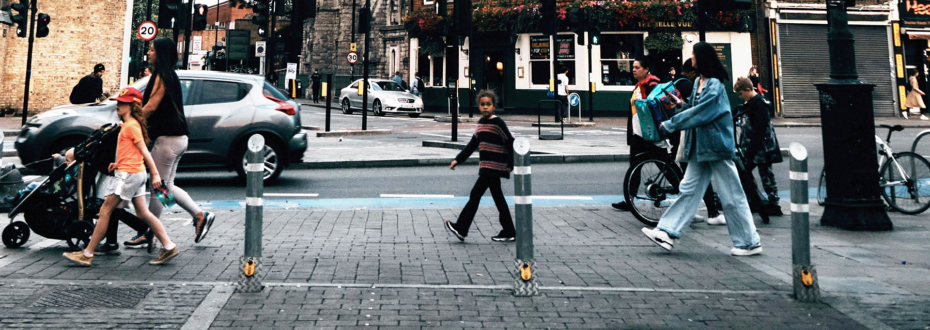By Frederico Cardoso
Poverty is costly
Living in poverty represents one of the biggest risks to our mental health, with children from the poorest 20% of households being four times more likely to experience mental health difficulties by the age of 11 as those from the richest 20%. In 2021, more than one in five people lived in relative poverty in the UK. Of these, 2.1 million were pensioners and 4.3 million were children. New research shows at least 271,000 people were recorded as homeless in England – including 123,000 children. In 2021/22, approximately 2.17 million people used a food bank. The Trussell Trust’s food bank network alone provided 1.3 million emergency food parcels between April and September 2022.
Poverty does not affect everyone equally, and the cost-of-living crisis has exacerbated disparities. While 27% of children live in poverty, over half of Black children in the UK fall below the poverty line. Structural racism perpetuates poverty, with all racialised groups more likely to be living in poverty, as well as experiencing poorer mental health outcomes. For example, 46% of Pakistani people and 45% of Bangladeshi people live in poverty. Similarly, women are more likely to live in poverty than men.
It is hard to improve mental health on a broad scale without reducing poverty. Research from Centre for Mental Health has highlighted that poverty is associated with a five-fold increase in rates of child abuse and neglect, a twelve-fold increase in adverse childhood events, and increases in the likelihood of children entering care, experiencing poor mental health, and worse social outcomes later in life.
In the sixth wealthiest economy in the world, poverty should not be acceptable. The UK’s GDP (gross domestic product, or the value of a country’s economic output) was just under £2.2 trillion in 2021, with a GDP per capita of close to £32,000. Homelessness, food banks, and energy poverty should all be relics of the past by now.
Time for a change?
Our social security system has slowly been morphing into a workfare system. While a safety net should be provided for all citizens – and the one currently in place has some large holes – we ought to do better in 2023. The system is paternalistic, bureaucratic, reactive, and expensive to run. Conditionality checks and forced job requirements are othering, as if assuming the poor aren’t doing enough not to be poor. This is despite 66% of households in poverty having at least one adult working part time or more, and 19% of them at least one adult working full time, in 2019/20. No one’s standard of living should fall below having their basic needs met.
The impact of the cost-of-living crisis has shown the need for a universal basic income (UBI) – a regular, unconditional payment given to all adults in society to create a minimum income floor. This would create a baseline with dignity – while several models and amounts could be tested, the ultimate goal could be lifting everyone above the poverty line, currently defined for households as 60% of median household incomes after housing costs. Importantly, a universal basic income is not intended to replace most benefits, such as pensions or disability benefits, but to complement them.
Is universal basic income a good idea?
The political economist Albert Hirschmann pointed out that any big new social policy is initially attacked on the grounds of futility (it would not work), perversity (it would have unintended consequences), and jeopardy (it would endanger other goals). These arguments were used against unemployment benefits, family benefits, and old age pensions in the early 20th century. Some are now resurfacing:
It’s utopian/it has never been done before
While a universal basic income can seem like a radical proposal, it’s wise to remember that every new policy is a trailblazer in its own way. Critics may point out that a failed attempt to implement a universal basic income could create massive disruption to the social security system. However, policies under the current social security model are arguably failing to meet the needs of the most vulnerable, as highlighted by the cost-of-living crisis and the subsequent rise in homelessness and food bank usage, for example. New solutions are needed, and universal basic income pilots reveal promising results.
It’s unaffordable
Critics claim that a universal basic income generous enough to eradicate poverty would be too expensive to finance, while lower-than-poverty-level UBIs would not result in large parts of the alleged benefits.
Poverty cost the UK £78 billion a year in 2016 – £99.1 billion in 2023 prices. Establishing a universal basic income could result in savings in e.g. health care expenditures, including mental health; police and the criminal justice system; and children’s services and early years provision.
A recent microsimulation analysis estimated the cost of a poverty-level universal basic income for the UK at £67 billion per year, amounting to £7,706 for adults and £3,853 for children. The scheme would be a net financial benefit to most households in the lower 70% of UK income distribution, effectively representing a wage subsidy (or tax cut). Under the scheme, the authors estimated the percentage of UK families with incomes below the poverty line would drop from 16% to 4%, and poverty among children and the elderly would all but disappear.
Universal basic income advocates assume the poor just lack cash
While other factors also contribute to better overall quality of life and mental health, they’re mostly right. Evidence from GiveDirectly’s impact in Kenya, measured through Randomized Controlled Trials, is clear, showing increases of $270 in earnings, $430 in assets, $330 in nutrition spend, and 0% effect in alcohol and tobacco spend, per $1,000 dollars spent. UBI trials in India, Namibia, and Kenya reveal people spend less on ‘bads’, and mostly on private ‘goods’, which shouldn’t be surprising given that drugs are often used to cope with the stress of poverty. Experiments such as Mincome in Canada, the Alaska Permanent Fund, or Barcelona’s “B-MINCOME” have taken communities from struggling to flourishing, showing equally promising results.
We’d also be giving money to the rich
Many advocates of a universal basic income see it as a social dividend, i.e. a right for all. Regardless, it is easier and less costly to pay a basic income to everyone and tax that income from the more affluent, as was done with family allowances in the 1960s. Conversely, a targeted, means-tested system is dependent on take-up rates, degrees of progressiveness, and administrative efficiency.
It lacks reciprocity: something for nothing
This also holds true for wealth inheritance and all other forms of income not derived from productive activity. All of us benefit from goods without reciprocity: knowledge built by previous generations, institutions, social capital, the commons, some public goods. The same principle applies to community-oriented services such as food banks. Further, several universal basic income trials have shown high returns on investment – thus society would still be getting its money’s worth.
It reduces work
Evidence does not support this so far. Most trials reveal close-to-constant labour supply. Some studies have shown slight decreases, mainly due to students staying longer in university and young mothers taking longer on maternity leave.
It lowers wages
A basic income would give people a greater ability to refuse exploitative wage offers and more confidence to bargain for higher wages.
It’s inflationary
This argument ignores supply-side effects, namely the impact of extra spending power on the supply of goods and services. Families on lower incomes have higher marginal propensity to consume, thus boosting aggregate demand, leading to adjustments in the long-run aggregate supply of goods and services. Universal basic income trials in India, for instance, showed decreases in the unit price of supplied food and clothes in communities.
What would a world with universal basic income look like?
In May 2009, fifteen ‘veteran’ homeless men were selected in London. Between court costs, social services, and police expenses, costs for the system were estimated around £400,000 per year. The charity Broadway took a radical decision – each person would get £3,000 in spending money. No strings attached.
After one year, they had spent on average just £800 on what they decided they needed – a reading chair, books, a telephone, a dictionary, a hearing aid. Some started taking gardening and cooking classes. A year and a half later, nine of them had a roof over their head. They started looking after themselves, visiting their families, and planning for the future. The cost of the whole programme? £50,000, including the workers’ wages.
Introducing a universal basic income could be a means to restoring dignity for the millions currently living in poverty in the UK. It could help to create a world with more freedom: to quit a job you don’t like, to change careers, to do more volunteering, or better balance caring responsibilities. A world with improved social justice, correcting some of the imbalances imposed by structural racism, self-perpetuating inequalities, and poverty.
These changes would all contribute to better mental health. The UK population is experiencing growing rates of poor mental health exacerbated by financial concerns. Ensuring everyone a minimum standard of living would represent a preventative good and remove many of the environmental pressures leading to the mental ill health of the nation. In this world, a universal basic income would be a bargain.







